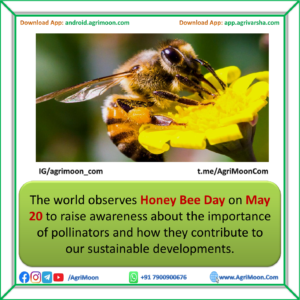World Honey Bee Day
Well, Beekeeping is one of the oldest traditional practices for collecting the honey. Apiculture Farming is becoming popular due high market demand in national and international markets. We get many benefits from nature one of them is Honey Bee. Honeybees also produce honey, bee wax and royal jelly thus giving additional benefits to the farmers. We don’t think about the important role that all of living creatures play. However, World Honey Bee Day gives you the perfect opportunity to pay honour to the amazing creature (God’s Gift) honey bee.
About World Honey Bee Day
The world observes Bee Day on May 20 to raise awareness about the importance of pollinators and how they contribute to our sustainable developments. Human activities, however, have been increasingly putting bees and other pollinators such as butterflies, bats and humming birds under threat.
Pollination is a fundamental process needed for the survival of our ecosystems. It is the highest agricultural contributor to yields worldwide, contributing far beyond any other agricultural management practice. The vast majority of pollinators are wild, including over 20,000 species of bees. Main theme of celebrating World Honey Bee Day is to SAVE HONEYBEES.
History of World Honey Bee Day
World Honey Bee Day, previously known as Honey Bee Awareness Day, is an idea put together by beekeepers in the USA, who petitioned the USDA in 2009 for an official day to honor honey bees and beekeeping. A few years down the line, people across the globe are holding a date of observation every year.
Benefits of Honey and Honey Bee
There are lots of nutritional benefits that are associated with adding a bit of honey to your diet. High-quality honey offers a number of benefits because of the antioxidants that are included. These include phenolic compounds, such as flavonoids, as well as organic acids. They are also believed to assist in terms of eye health.
Honey can help to improve your cholesterol levels. Honey cannot only benefit you in terms of consuming it, but it has been used for many years as a topical treatment for healing burns and wounds. Researchers have concluded that the healing powers of honey come from the anti-inflammatory and antibacterial effects it has, as well as its ability to nourish the tissue that surrounds the wounded area.
Useful products obtained from honey bees are bee pollen, royal jelly, propolis and bee venom.
Also Read: International and National Agriculture Days
Honey: The foraging worker bees suck the nectar from various flowers. The nectar passes to the honey sac. In the honey sac (honey stomach), sucrose present in the nectar mixes with acidic secretion and by enzymatic action it is converted into honey which is stored in the special chambers of the hive.
Bee wax: Bee wax is the natural by-product secreted by the wax glands of worker bee to construct the combs of bee hive. It is widely used in cosmetic and pharmaceutical industries. It is used for making candles, water proofing materials, polishes for floors, furniture, appliances, leather and taps and also
Bee Venom: Bee venom is a colourless, acidic liquid. Bees excrete it through their stingers into a target when they sting. It contains both anti-inflammatory and inflammatory compounds, including enzymes, sugars, minerals, and amino acids. Bee venom is used for treating rheumatoid arthritis, nerve pain, multiple sclerosis etc.
Royal jelly: Royal jelly is a secretion produced by the hypopharyngeal glands of nurse bees that is used in the nutrition of larvae as well as adult queen. Royal jelly is used in the treatment of asthma and also as a dietary supplement.
How to conserve Honey Bee
Honey bee population decline on a worldwide scale. This is because they face a number of different threats. The use of toxic pesticides is one of these threats. They are also at risk due to habitat loss, as there has been an increase in invasive farming methods and urban developments, In honor of World Honey Bee Day, it is good to do your bit in order to raise awareness regarding the risks that honey bees all around the world face and the steps that we can take in order to help them. Honey bees and providing them with a supportive environment. When we plant wildflowers, orchards, and other flowering plants, we support pollinators such as honey bees. They depend on the nectar of a variety of plants for their survival. Conversely, we depend on honeybees for our survival, too! Without their pollinating abilities, many nutritious plants wouldn’t reproduce.
As a person Can perform following activities
- planting a diverse set of native plants, which flower at different times of the year.
- Buying raw honey from local farmers.
- Buying products from sustainable agricultural practices.
- Avoiding pesticides, fungicides or herbicides in our gardens.
- Protecting wild bee colonies when possible.
Practices for farmers to perform to conserve Honey Bees create a good habitat for bees to ensure pollination include: leaving some areas under natural habitat; creating hedgerows; reducing or changing the usage of pesticides; leaving nesting sites; and planting attractive crops around the field.
Honey Bee lovers want to give message about importance of honey bees for :
- Sustainable development of agriculture through pollination support,
- Importance in human life,
- Environmental sustainability,
- Maintaining bio-diversity,
- Generating income and employment
- Adoption for livelihood.
By doing this, we will then be able to educate others and we can all do our bit to make sure that the number of bees starts to increase again, rather than decline. So Honey bees are very much important in overall sustainability of life on earth.
~Adusumelli Akshay
For Daily Update follow us at:
Facebook Telegram Whatsapp Instagram YouTube
If you are facing any Problem than fill form Contact Us or send Mail at info@agrimoon.com


One thought on “World Honey Bee Day 20 May”